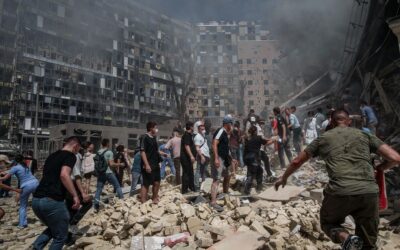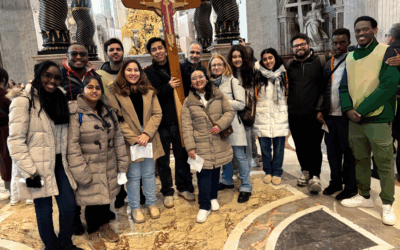“May they all be one” If you have had the adventure of travelling to the Holy Land in springtime, among the thousands of things that Jerusalem offers for your contemplation and meditation, there is one that strikes you in a unique way because of what it recalls in its utter simplicity. Having endured in time and cleansed by the inclement weather of two thousand years, a long stone stairway, dotted with bright red poppies – red like the blood of the Passion – unfolds almost like a crinkled ribbon, descending down limpid and solemn towards the Kidron Valley. Bare and in the open, with grass growing along its edges, one has the impression that no temple dome could replace the heavens that crown it. Jesus descended those steps – tradition recounts – on that last night, after the last supper, and “raising his eyes to heaven” filled with stars, he prayed: “Father, the hour has come….”. It is moving to place your feet where the feet of a God once stepped; your whole soul is mirrored in your eyes as you gaze on the heavenly vault looked upon by the eyes of a God. And you may be so struck that this meditation nails you in adoration. His was a unique prayer before dying. And the more God, this “Son of man” whom you adore, shines forth, the more you feel that he is man and you fall in love with him. His is a discourse which only the Father fully understood, and yet he prayed aloud, perhaps so that such a melodious echo would ring out to us. 1943. We do not know why, but it is certain that the first focolarine, gathered together in search of the love of God, read that passage almost every evening by the light of a candle – because often there was no electricity. It was the magna charta of a Christian. Those words, unfamiliar to them, shone forth like the sun in the night: the night of a time of war. For three years Jesus had often spoken to the throngs: he had pronounced Heavenly words, sowed among the hard-headed, announced a program of peace, but had offered his divine patrimony almost adapting it to the minds of his followers, and his parables bear witness to this. But now that he is not speaking to the earth, and his voice is directed to the Father, he no longer seems to hold back his ardour. That Man, who is God, is splendid as he pours out – like a flowing fountain of Eternal Life – Water that engulfs the soul of a Christian lost in him, in the boundless seas of the blessed Trinity. And that farewell discourse appeared to be beautiful like him: To be one as Jesus is one with the Father: but what did it mean? We didn’t understand very much, but we understood that it had to be something great. This is why one day we gathered around an altar, united in the name of Jesus, and we asked him to teach us to live this truth. He knew what it meant and he alone could disclose the secret to accomplishing it. “But now I am coming to you… so that they may share my joy completely.” Hadn’t we experienced a new joy in that brief experience of unity that we had lived? Was Jesus speaking perhaps of that? It is certain that a Christian must be clothed with joy, and Someone within us made us understand that for those who follow Christ, joy is a duty, because God loves a cheerful giver. “I do not ask that you take them out of the world but that you keep them from the evil one.” This life – at least for us – was fascinating and new: to live in the world, which everyone knows is in antithesis to God, and to live there for God in a heavenly adventure…. “Consecrate them in the truth. I pray not only for them, but also for those who will believe in me through their word, so that they may all be one.” What kind of Christianity had we lived before, if we had passed each other with indifference, if not with contempt and judgement, when our destiny was to be fused in that unity invoked by Christ? With these words, it seemed to us that Jesus was throwing down a rope to us from heaven to tie us dispersed members in unity – through him – with the Father, and in unity among us. And the mystical Body was revealed to us in all of its reality, truth and beauty. “As you, Father, are in me and I in you, that they also may be in us.” As Jesus is one with the Father, so each one of us would have had to be one with Jesus and, consequently, one with the others: it was a way of living we had barely thought of before: a way of living “according to the Trinity”…. “So that the world may believe that you sent me.” The conversion of the world around us would have come as the consequence of our unity. This perhaps explains why, from the very dawning of the Movement, many people returned to God without our trying to convert them, but only by trying to keep unity among us and to love them in Christ. “I have given them the glory you gave me, that they may be brought to perfection as one, that the world may know that you sent me….” People would have believed in Christ if we were perfect in unity. Therefore, we had to perfect ourselves in this life. We would have to put aside everything for unity. 1943 was also the year of the Mystici Corporis: Christ in Pope Pius XII echoed His Testament. Could it be that Jesus, who lives in his Head and in his Body, urged us also to emphasize the need for unity and to give this gift to many? Unity, unity, all one! In times in which the fundamental idea of Christ was becoming deformed and depleted into the cornerstone of the atheist revolution, God wished perhaps to underline it for us in the Gospel. We do not know. We know only that the Focolare Movement had that unmistakable stamp and that nothing has more value for us than unity: – because it is the subject of the Testament of the One we want to love above all things; – because from the experience lived so far, it is very rich and very fruitful for the Kingdom of God, for his Church. “I made known to them your name and I will make it known, that the love with which you loved me may be in them and I in them.” After saying these things Jesus went out with his disciples across the Kidron Valley…. Published by “Città Nuova”, 15 December 1959
Be capable of closeness
Be capable of closeness




0 Comments